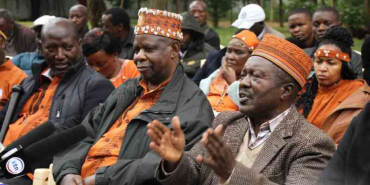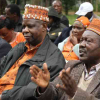Raila, Gachagua Find Common Ground on Revenue Formula

Kenyan politics has been embroiled in a heated debate surrounding revenue-sharing formulas with Azimio leader Raila Odinga throwing his weight behind the controversial 'one-man, one-shilling, one-vote' model.
This approach advocates for allocating revenue based on a region's population rather than its geographical size, a concept that has garnered both support and opposition from various quarters. At the heart of the controversy lies the Rift Valley region where Odinga has faced a significant political setback. Within a span of one year, almost all of his key allies in the region have deserted him. The Rift Valley region plays a pivotal role in Kenya's political landscape.
Deputy President Rigathi Gachagua has been a staunch advocate of the 'one-man, one-shilling, one-vote' formula, daring Mt Kenya leaders who oppose him to clarify their stance. Despite criticism from leaders in arid and semi-arid regions, Gachagua remains steadfast in his advocacy, emphasizing the importance of aligning with the aspirations of the people. However, the Commission on Revenue Allocation (CRA) has expressed reservations about the practicality of allocating funds solely based on population.
The CRA maintains that no county has officially proposed the 'one-man, one-shilling, one-vote' principle as a parameter for resource allocation, instead emphasizing the need for equitable development across all regions. The debate has sparked strong reactions from various county leaders. Uasin Gishu Governor Jonathan Bii dismisses the proposal as untenable, asserting that Kenyans deserve equitable sharing of national resources, regardless of their location. Meanwhile, leaders from dry counties in various parts of Kenya, including Mandera, Wajir, Garissa, and Turkana, have vowed to fight for an alternative formula – the 'one-vote, one-kilometre, one-shilling' approach.
Former Senate Speaker Ekwe Ethuro reiterates the significant contribution of pastoralist regions to the country's politics and economy, underscoring the need for a balanced and inclusive revenue-sharing model. As the debate rages on, it is evident that the 'one-man, one-shilling, one-vote' formula has polarized opinions, with proponents advocating for a population-based approach and opponents emphasizing the importance of considering geographical factors and equitable development.








Add new comment